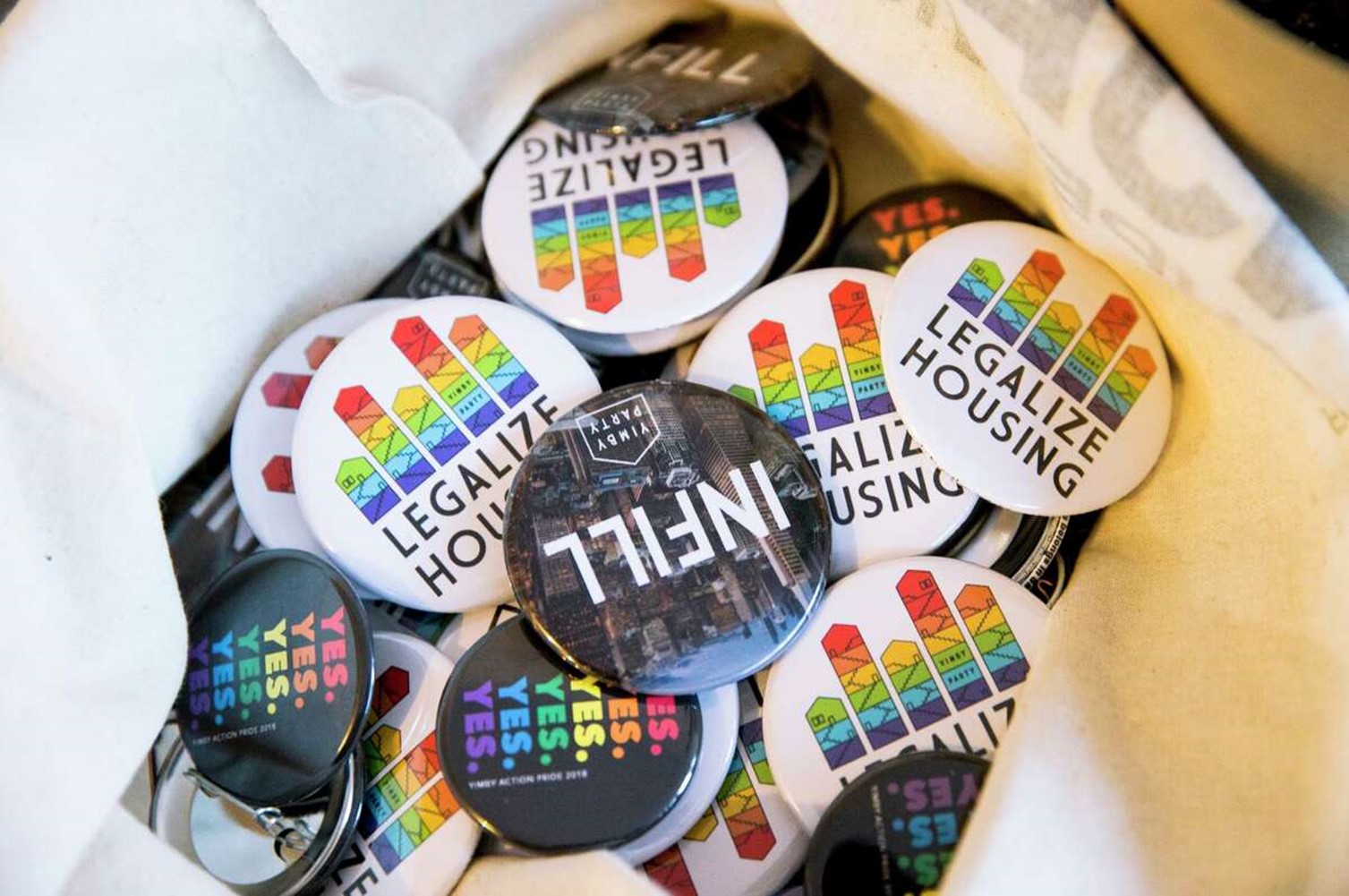
YIMBYism is one of the few policy platforms providing data and evidence-based solutions to advancing the human condition. Jessica Christian/The Chronicle 2018
By Bilal Mahmood, SF Chronicle, August 25, 2022
Pop quiz — which of these statements was made by a progressive?
Person A: “Ending single-family zoning … is demolishing homes to put up rental units. (It’s just for) real estate developers to make more money.”
Person B: “What we need to know about our housing crisis, is that the reason why people are on the streets … is because we’ve chosen not to build.”
If one solely followed San Francisco politics, you may think Person A was the progressive. In fact, it was Tucker Carlson.
Person B is an actual progressive — Rep. Alexandria Ocasio-Cortez. And her brand of housing reform, progressive YIMBYism, is quickly spreading throughout our country.
Why? Because YIMBYism is progressive in its policy goals.
Progressivism is a movement to advance the human condition through social reform. Its policies are based on the idea that government should have a role in ensuring a social safety net — be it through tenant protections, guaranteed income or affordable housing. It asserts that wealth taxes are a sustainable mechanism to fund those objectives equitably. And it insists that fighting against climate change through government action is an imperative for ensuring an equitable habitat for future generations.
In other words, progressivism is about fighting inequality to protect the most vulnerable. And YIMBYism works in concert with that vision.
YIMBYism is a movement to advance more housing for all through a “yes in my backyard” approach to development. Its policies are centered around the fact that housing laws, such as exclusionary zoning and byzantine permitting processes, make it impossible to build housing. YIMBYism is saying “yes” to social reform that gets rid of the laws that benefit the wealthy and prejudice against historically marginalized communities by developing for future generations.
And while some may claim the movement is run by developer shills — with less empathy for tenants rights or rent stability — that assertion couldn’t be further from the truth.
Many progressive YIMBYs believe that housing policies have to work in concert with other progressive frameworks to achieve our vision of housing for all. We believe both market-rate and affordable housing are necessary to build what we need to support future generations. We understand that social housing — mixed-income development on government-owned land — is an effective model for filling in a missing affordable supply. We believe rent control and eviction protection is necessary to help communities remain in their homes. We believe redesigning our cities to be denser and less reliant on cars is a powerful lever to fight climate change.
YIMBYism isn’t opposed to tenant protections, public financing, community benefits and taxing the wealthy. These policies support our vision.
YIMBYism is thus not just a complement, but a necessary means, to achieve a progressive society.
Many urban cities like San Francisco claim to be bastions for progressive values. But if you don’t build housing at all levels, working people can’t live there. If they can’t live where the economic opportunities are, other progressive values like abortion rights and marriage equality are de facto out of reach.
What good is a progressive society if no one can afford to live in it?
YIMBYism can help progressivism reach its ideals. It rightly notes that if you improve socioeconomic outcomes, you also improve socioeconomic and racial equality. YIMBYism is an example of “supply-side” progressivism — if you focus on increasing the supply of housing by ending restrictive and exclusionary zoning laws, you improve equitable outcomes through increased supply.
The data proves this. According to a UC Berkeley Terner Center study, cities with a standard deviation increase in zoned capacity saw a 30% increase in housing permits. Cities with new buildings saw a 5%-7% reduction in cost of rent. And cities with lower costs of rent saw a 300% comparative reduction in homelessness.
YIMBYism is one of the few policy platforms providing data and evidence-based solutions to advancing the human condition.
It’s no wonder then that the next generation of BIPOC activists are increasingly progressive YIMBYs.
In fact, contrary to the belief that the movement is just for white men, the most prominent spokespersons of YIMBYism are actually Black activists like Darrell Owens, LatinX politicians like Sunnyvale Vice Mayor Alysa Cisneros and Assembly Member Rob Rivas, LGBTQ leaders like Laura Foote and state Sen. Scott Wiener, Asian American representatives like BART Director Janice Li and Assembly Member Alex Lee, and female leaders like Annie Fryman and Assembly Member Buffy Wicks.
These YIMBYs are not “shills” for developers. In 2022 alone, YIMBY endorsed political candidates like Redwood City Mayor Giselle Hale were heavily attacked by a political action committee co-organized by the California Building Industry Association. Assembly Member Lee was infamously attacked by the same group for being “a socialist democrat who ‘lives with his mom.’ ” (As if that’s a bad thing!?)
So the next time you ask yourself whether you’re a progressive, I ask you to consider whether your housing platform sounds more like AOC or Carlson.
Because in cities where we need 66% approval to pass funding measures, where we need consensus to build more housing and more transit, we can’t build if we don’t unite. And if we don’t build, we won’t have housing that everyone can afford to live in. And if our most vulnerable can’t afford to live here, how will they enjoy our progressive freedoms?
YIMBYism is how we can ensure equitable access to that progressive future.
Bilal Mahmood is a civil servant and entrepreneur, and board member at SF YIMBY.

